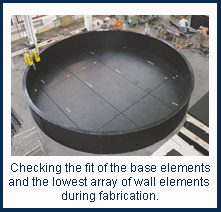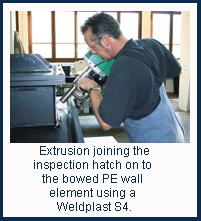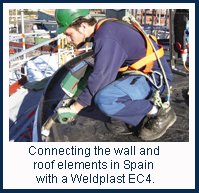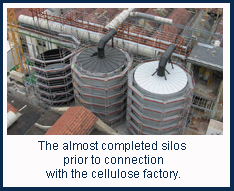|
Colasit Constructs Three Bio-washer Silos
In an otherwise empty
industrial building, previously
used by the Swiss
army, big things are emerging:
The company Colasit
 from the Berner Oberland
region of Switzerland rented
the building on a temporary
basis to prefabricate 25 mm
thick polyethylene panels
that would subsequently be
assembled in Spain. Three
massive silos were built in
the Basque Country, as commissioned
by the German
company m+w Zander
Gebäudetechnik GmbH;
these are now used in the
biological washing process.
They were integrated into a cellulose production plant.
Using this technique, organic airborne pollutants are now
extracted biologically in a multi-stage process. The waste
gases flow through packed beds, are absorbed on the surface
of substrate substances and are decomposed by
micro-organisms. The bio-washer results in a considerable
reduction in odor and pollutant emissions. The population
of Torrelavega and the surrounding region therefore waited
eagerly for the plant to
be commissioned.
from the Berner Oberland
region of Switzerland rented
the building on a temporary
basis to prefabricate 25 mm
thick polyethylene panels
that would subsequently be
assembled in Spain. Three
massive silos were built in
the Basque Country, as commissioned
by the German
company m+w Zander
Gebäudetechnik GmbH;
these are now used in the
biological washing process.
They were integrated into a cellulose production plant.
Using this technique, organic airborne pollutants are now
extracted biologically in a multi-stage process. The waste
gases flow through packed beds, are absorbed on the surface
of substrate substances and are decomposed by
micro-organisms. The bio-washer results in a considerable
reduction in odor and pollutant emissions. The population
of Torrelavega and the surrounding region therefore waited
eagerly for the plant to
be commissioned.
Each silo consists of four
stacked arrays, each with
ten wall elements. The panels
of the three upper arrays
are 3.8 m high, 2.67 m
wide and weigh 300 kg,
those in the lowest array are
half the dimensions. In
Thun, Switzerland, they
were first mounted on a fixture
device with a 4.25 m
radius. In order to maintain
the curvature, arch struts
slot-milled on both sides
were mounted of the upper
edge of the panels and
extrusion joined on the
inside and outside. The 210° to 230° hot extruded material
was delivered by powerful Weldplast EC4 and S4 hand
extruders from Leister (EC4 with brushless motors for
worm drive and hot air).
Three inspection hatches and a manhole were
 also welded
on the curved PE panels. The Leister hand extruders
also proved themselves equal to this awkward task. To
ensure that the hatches did not deform while the extrusion
material cooled, the covers were screwed on temporarily
after welding. As a fixture aid for the insulation to
be mounted later in Spain, four horizontal struts were also
mounted on the outside of the individual elements. Here
a simple welding seam was sufficient. The 4 mm thick welding
seam was produced with the DIODE S hand tool from Leister.
also welded
on the curved PE panels. The Leister hand extruders
also proved themselves equal to this awkward task. To
ensure that the hatches did not deform while the extrusion
material cooled, the covers were screwed on temporarily
after welding. As a fixture aid for the insulation to
be mounted later in Spain, four horizontal struts were also
mounted on the outside of the individual elements. Here
a simple welding seam was sufficient. The 4 mm thick welding
seam was produced with the DIODE S hand tool from Leister.
Leister tools were also used in the final assembly phase in
the Basque Country: Around 10 Colasit employees welded
 around the clock, 6 days a week using the Weldplast S4 and
EC4 (brushless) extruders. With an output rate of up to 4
kg/h, joining of the parts proceeded apace. The individual
panels were mounted in a ring structure and were screwed
together on the
sides. The vertical
joints were then
welded. Once the
first array was finished,
the panels
for the second
array were inserted
into the slot of
the lower array
offset to the side
and were extrusion
joined on the
inside and outside
of the panels. The base and roof segments made of PE
were also welded to the wall elements in Spain.
around the clock, 6 days a week using the Weldplast S4 and
EC4 (brushless) extruders. With an output rate of up to 4
kg/h, joining of the parts proceeded apace. The individual
panels were mounted in a ring structure and were screwed
together on the
sides. The vertical
joints were then
welded. Once the
first array was finished,
the panels
for the second
array were inserted
into the slot of
the lower array
offset to the side
and were extrusion
joined on the
inside and outside
of the panels. The base and roof segments made of PE
were also welded to the wall elements in Spain.
The three completed silos boast impressive dimensions:
wall height 13.5 m, diameter 8.5 m, circumference 26.7 m.
 The plastics specialist from Colasit processed 45 tons of PE
panels in total. The total welding seam length amounted to
around 5 km!
The plastics specialist from Colasit processed 45 tons of PE
panels in total. The total welding seam length amounted to
around 5 km!
When the production plant in Spain goes into operation,
each of the three silos filled with 510 m3 wash packing and
water weighs around 200 tons. No question that the strength
of the joints is subject to extraordinary demands.
For Colasit, this contract was one of the biggest in its company’s
over 60 year history. Besides the logistics challenge, the
tight schedule also had to be observed: In just 5 1/2 months,
all the prefabricated elements had to be ready, transported to
Spain on nine trucks, the three silos built up and the complete
system connected with the cellulose production plant.
For more information, contact LEISTER Process
Technologies, Riedstrasse, CH-6060 Sarnen/Switzerland, 41
41 662 74 74, Fax: 41 41 662 74 16, E-mail: sales@leister.com, Web: www.leister.com.
|